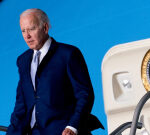WASHINGTON – Republican congressional leaders have always had trouble with their most conservative members – but not like this.
While Kevin McCarthy did finally rack up enough votes to become Speaker of the House, the deals he made – and the narrow margin of the GOP majority – may wind up giving the hardcore conservative movement the most power it has ever had, a movement that has lasted for decades.
“This takes it to a whole new level,” Jack Pitney, a professor of government at Claremont McKenna College and a former Republican who has studied conservative politics for decades.
How did the Republicans get here? Because ever-shifting groups of conservative activists have fought ever-evolving Republican establishments for more than a half-century, from Barry Goldwater to Ronald Reagan to Newt Gingrich to the Tea Party to Donald Trump to, now, the House Freedom Caucus.
A sign of things to come: McCarthy House speaker drama signals more interparty fights for GOP, lawmakers say
McCarthy prevails – for now: Recap: In dramatic 15th ballot, Republican Kevin McCarthy clinches House speaker vote; members sworn in
The battle over McCarthy and the speaker’s job angered many traditional Republicans who see this latest crop of ultra-conservatives as more interested in confrontation and television appearances than in governing or making policy.
Some said the power grabs by anti-McCarthy conservatives will lead to more chaos, government shutdowns, a breach of the debt ceiling that will crash markets, and GOP campaign losses.
“For the past six years, Donald Trump has shown that you do not have to have principles to be the leader of the party,” said Republican strategist Susan Del Percio. “These 20 are doing this because they can. They do not care about governing, just destroying.”
The insurgents say that, over the years, Republican leaders have bowed to the “status quo” and failed to follow through on promises to cut spending and downsize government. The national debt, they often point out, has ballooned over the past decades no matter which party was in charge – though they do not mention that their plans have often been foiled by Democratic senators and presidents.
During their efforts to block McCarthy, Rep. Lauren Boebert, R-Colo., said that “for far too long, conservatives left their leverage on the table and let the establishment ignore us and sideline us.”
There’s also a more prosaic reason that arch-conservatives like Boebert and Rep. Matt Gaetz, R-Fla., can wield power these angry days: There are about 20 of them, and the Republican Party has only a 9-seat majority in the House – meaning as few as five Republicans can scuttle legislation by switching their votes.
“When you don’t have a big margin,” Pitney said, “the people at the margins have a lot of leverage.”
Culture wars: House Republicans attack Defense Department for ‘woke’ social policies
‘It began with us’
Back in the 1930s, humorist Will Rogers made a famous joke about a certain political party: “I am not a member of any organized party. I’m a Democrat.”
Charlie Gerow, a Republican strategist and vice chair of the Conservative Political Action Coalition, said he thought about Rogers’ joke while watching Republican infighting this week.
“But I guess now you’d say, ‘I don’t belong to any political party. I’m a Republican,’” he said.
The Tea Party and Trump: A foreseeable fire: A steady diet of red meat turned the Tea Party into Trumpism
The new faction: What is the House Freedom Caucus and why is Trump attacking its members?
When did it start to change? Different people cite different eras.
Former Illinois GOP Rep. Joe Walsh traced it to the rise of the Tea Party that fueled his election to the House in 2010, the year the GOP won Congress by running against President Barack Obama and his health care plan. Tea Party members who took office intensified their attacks on Obama, the Democrats, and, in some cases, Republican leaders.
“No doubt, it began with us,” Walsh said. “You can draw a direct line.”
Walsh served one term, losing in 2012 to then-Democratic candidate and current U.S. Sen. Tammy Duckworth. In 2020, he switched his party affiliation from Republican to independent, saying his former party “became a cult.”
Never conservative enough
The Tea Party and its successor also evolved from movements that have marked Republican politics since they formed in the years before the Civil War.
They have differences among themselves, but share a pattern: Whenever a leader ascends to the top, a new faction develops to argue that they are drifting from the cause and placating the “establishment.” It seems these establishments haven’t been conservative enough.
It happens in all parties, but recent Republicans have been especially noisy.
“You’re always going to have some folks far out there who don’t think the leadership – the establishment – is liberal or conservative enough,” said Matthew Green, a professor of politics at Catholic University who has written about political factions.
The very first Republican president, Abraham Lincoln, faced the wrath of “Radical Republicans” over the conduct of the Civil War and the pace of slave emancipation.
In the pivotal election of 1912, former Republican President Theodore Roosevelt, more progressive than party stalwarts, ran against more conservative successor William Howard Taft. Roosevelt wound up leading a third party that split the GOP vote and helped elect Democrat Woodrow Wilson (and made the GOP a more conservative institution as a result).
Biggest takeaways: Kevin McCarthy elected 55th House speaker, quashes GOP rebellion with major concessions
From Goldwater to Gingrich
The current group of hardliners can also trace their lineage to a defeated presidential candidate from nearly 60 years ago: Barry Goldwater.
In 1964, Goldwater mounted an insurgent campaign against the so-called “Eastern Establishment,” and managed to capture the nomination at a fractious convention. The Arizona standard-bearer lost in a landslide to President Lyndon Johnson – a year after John Kennedy’s assassination – but he inspired a number of conservative followers into politics.
One of them, Ronald Reagan, became governor of California and, in 1976, challenged incumbent Republican President Gerald Ford for the Republican nomination. Reagan lost, narrowly, but came back four years later to win the presidency, a major milestone for the conservative movement.
During his presidency, Reagan also took some flak from his far right – “let Reagan be Reagan!” went the mantra – but other conservatives during the 1980s took aim at a different target: The U.S. House, which Democrats had controlled for decades.
One of their leaders was a backbencher named Newt Gingrich, who argued – like conservatives before and since – that Republican leaders gave in too much to the Democratic majority. Launching a steady volley of verbal attacks on Democrats, and som





